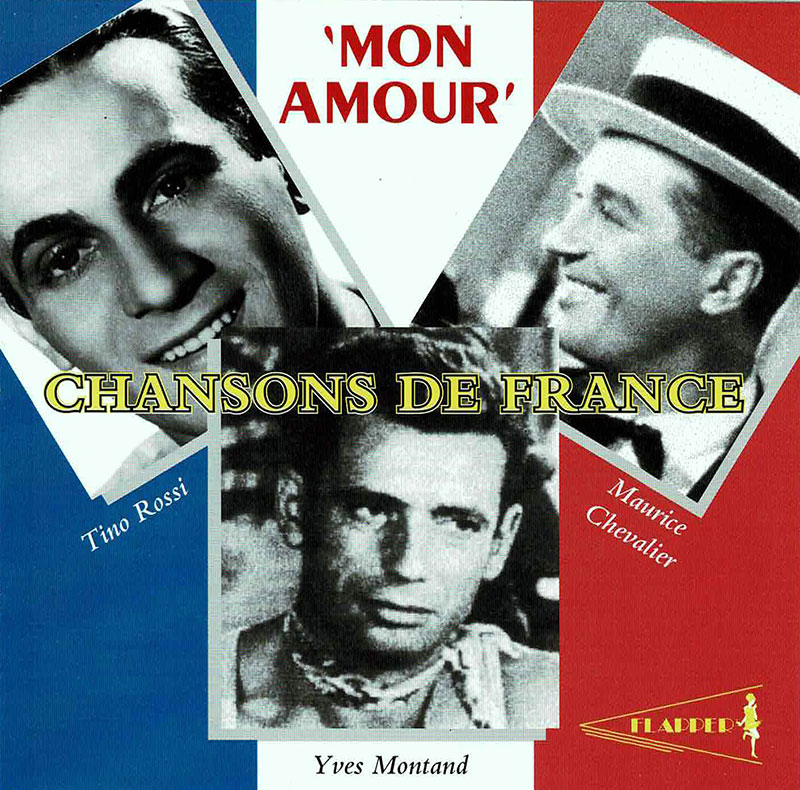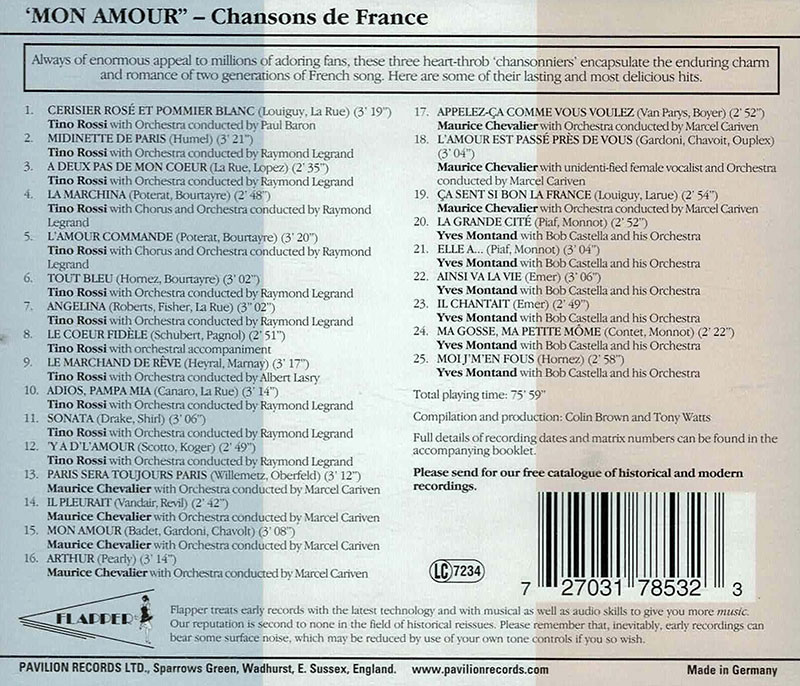Logowanie
Dziś nikt już tak genialnie nie jazzuje!
Bobby Hutcherson, Joe Sample
San Francisco
SHM-CD/SACD - NOWY FORMAT - DŻWIĘK TAK CZYSTY, JAK Z CZASU WIELKIEGO WYBUCHU!
Wayne Shorter, Freddie Hubbard, Herbie Hancock, Ron Carter, Elvin Jones
Speak no evil
UHQCD - dotknij Oryginału - MQA (Master Quality Authenticated)
Chesky! Niezmiennie perfekcyjny
Winylowy niezbędnik
ClearAudio
Double Matrix Professional - Sonic
najbardziej inteligentna i skuteczna pralka do płyt winylowych wszelkiego typu - całkowicie automatyczna
Tino Rossi, Yves Montand, Maurice Chevalier
Mon amour

- 1. Cerisier Rose Et Pommier Blanc - Tino Rossi
- 2. Midinette De Paris - Tino Rossi
- 3. A Deux Pas De Mon Coeur - Tino Rossi
- 4. La Marchina - Tino Rossi
- 5. L'Amour Commande - Tino Rossi
- 6. Tout Blue - Tino Rossi
- 7. Angelina - Tino Rossi
- 8. Le Coeur Fidele - Tino Rossi
- 9. Le Marchand De Reve - Tino Rossi
- 10. Adios, Pampa Mia - Tino Rossi
- 11. Sonata - Tino Rossi
- 12. 'Y A D'L'Amour - Tino Rossi
- 13. Paris Sera Toujours Paris - Maurice Chevalier
- 14. Il Pleurait - Maurice Chevalier
- 15. Mon Amour - Maurice Chevalier
- 16. Arthur - Maurice Chevalier
- 17. Appelez-Ca Comme Vous Voulez - Maurice Chevalier
- 18. L'Amour Est Passe Pres De Vous - Maurice Chevalier
- 19. Ca Sent Si Bon La France - Maurice Chevalier
- 20. La Grande Cite - Yves Montand
- 21. Elle A... - Yves Montand
- 22. Ainsi Va La Vie - Yves Montand
- 23. Il Chantait - Yves Montand
- 24. Ma Gosse, Ma Petite Mome - Yves Montand
- 25. Moi J'M'En Fous - Yves Montand
- Tino Rossi - vocal
- Yves Montand - vocal
- Maurice Chevalier - vocal
This compilation highlights the work of three French singers; all with the sort of charm which gave them the status of a `heart throb'. There the similarity ends for Tino Rossi, Maurice Chevalier and Yves Montand could not have been more different artists. Rossi had a light, high tenor voice which he used in both popular material and light operatic arias with the utmost delicacy. Chevalier initially made his name on stage, before becoming a film star on both sides of the Atlantic. His vocalism was far from fragile for his `all -out' style was best suited to up-tempo numbers which he would fill with his outsized personality and magnetic presence Montand was of the following generation. Some thirty years youngerthan Chevalier and fifteen years Rossi's j unit >r, his singing and persona reflected the changing postwarworld in which he first achieved stardom. His more modern style was ideally suited to cabaret in which he excelled in the days before he too turned to the silver screen. A triumvirate of great performers who, between them, display the range of French popular song. Once describes I as the most fatuous Corsican after Napoleon Bonaparte, Tino Rossi began his long professional career by singing in 'cafe-concerts' in the Aix-enProvence area, graduating to large venues such as music halls; his first big engagement was at the Alcazar in Marseilles in 1927. Rossi made his initial records through a set of circumstances which would have been hard to believe had they been part of a script for a Hollywood musical. On one occasion when his father was visiting him in Marseilles, the two Roosis were browsing in a record shop in the Rue Saint-Ferroel when they saw a poster advertising a new gadget. For a mere five francs you could stand in a special soundproof booth and make a recording of your own voice. Realising that it would make a splendid souvenir to send back home to his mother, Tino paid his money and started to sing. As if by magic a representative of the Odeon record company entered the shop at that very moment, was highly impressed with what he heard and recommended the youngster to his superiors at the label's head office in Paris. A few weeks later Rossi was on his way to the French capital to make his first commercial recordings. The repertoire consisted of rather obscure Corsican folk songs; the discs failed to make much impact, and his career took a long time really to take off- seven years. The Casino de Paris had experienced an unprecedented succession of flops which had brought it close to financial ruin. It was decided to mount a new revue to be produced on a shoestring budget, with a cast of young hopefuls working for a low fee. Tino joined the show and created a sensation with his mixture of tuneful songs and light operatic arias; a change from the other jazzinfluenced acts. Rossi soon began making recordings in earnest with many of his releases selling in vast numbers. He also became a film star with some twenty-five movies to his credit including Marcel Pagnol's 1948 production `La belle meuniere' (`The Maid of the Mill"), in which he gave a splendid dramatic performance as the composer Franz Schubert. On stage, he appeared in several musical comedies as well as touring Germany and Great Britain. Later in life, he was immensely popular on television with regular shows during the 'fifties and'sixties. He was as debonair, charming and charismatic as ever. When Rossi died in September 1983 he was celebrated as one of France's greatest performers. His singing has lost none of its appeal over the years. Maurice Chevalier was probably the most famous internationally of all male French artists. He oozed what the public perceived to be Gallic charm and pronounced the English language with an accent which could be cut with a knife. It is rumoured that he turned it on and off like a tap, frequently asking directors if they wanted the Trenchness' turned up a notch or two. Chevalier's career began in 1906, when still in his 'teens. He quickly became a popular figure at the Folies Bergeres, where he partnered Mistinguett, until he enlisted in the Army in 1914. He was taken prisoner and not released until the end of the conflict, then returning to the Follies, where he developed the role of the straw-hatted, urbane, lady's man that he was to play for the next half-century or so. It was his many films which made his name known throughout the world. His first major Hollywood movie, `Innocents of Paris', in 1929 was followed by `The Love Parade', `The Big Pond', `One Hour With You', `Love Me Tonight' and a version of 'The Merry Widow' directed by Ernst Lubitsch. Without going into all the details, it has to be said that Chevalier had a bad war. In 1945 it seemed that he was persona nongrata in several countries and found engagements extremely hard to come by for some years. By the time the decade ended his mistakes had been forgiven, if not forgotten and lie was back making films in France and starting the series of one-man shows he was to take around the world until the late 'sixties. Hollywood was almost the last place to rehabilitate Chevalier, although even the studios had relented by 1957 when he returned to make `Love In The Afternoon'. He was subsequently awarded a special Oscar for his services to the industry. By now cast as the elderly roue rather than the young lover, he played the part for all it was worth in the 1958 musical `Gigi' singing Thank Heaven For Little Girls and reminiscing with Hemione Gingold in I Remember It Well. When Chevalier died on 1st January 1972 he enjoyed a better press than would have bene imaginable just after the war. His golden Indian Summer had helped to heal earlier deep wounds. Yves Montand was French by adoption rather than birth, having first seen the light of day as Yvo Livi in a village in Tuscany on 13 October 1921. He and his parents fled from the Mussolini regime and settled in Marseilles while he was still a boy: the family lived in conditions of grinding poverty. Initially influenced by Fred Astaire, Montand took some time to establish his own artistic individuality. He made his stage debut in 1938, then played the Alcazar singing songs originally made famous by Charles Trenet, Fernandel and Maurice Chevalier. Towards the end of the war Montand began to clock up hit records and also starred in cabaret with Edith Piaf who championed the cause of the young artist. His stage act was, by now, far more unconventional, featuring his own brand of eccentric dancing together with an assortment of songs which ranged from high comedy numbers to moving ballads. Montand's burgeoning film career first took off in France with movies such as `Les porter de la nuit', `Souvenir perdus', `Napoleon', Marguerit de la nuit', `Les Sorcieres de Salem', `La loi', and `Le salaire de la peur' which won the prestigious `Palmed d'Or' at the 1953 Cannes Film Festival. He proved himself a highly-efficient actor. His good looks, personal magnetism and allround talent attracted the attention of the Hollywood moguls who turned Montand into an international star in a long string of box office hits including `Let's Make Love' (directed by George Cukor and co-starring Marilyn Monroe), `Sanctuary', `My Geisha' and `On A Clear Day You Can See Forever' (with Barbra Streisand). His long-lasting marriage to actress Simone Signoret survived for thirtyfive years despite Montand's occasional, well-publicised `indiscretions'. Despite making a fortune in the States, Montand did not neglect the French cinema industry with starring roles in `La Guerre est flni', `Vivre pourvivre', `Un soir, un train', `L'aveu' and a memorable character part in the award-winning Jean de Florette' among others. Nor did he forget his musical roots as he kept up regular engagements in nightclubs. By the 'sixties he had become a superb interpreter of the French repertoire. Taking his lead from his idol, Astaire, his singing was understated, both highly musical and supremely intelligent in his response to the text. His death in November 1991 severed one of the last remaining links to the golden age of French cabaret singers. The recordings included here feature Yves Montand at the very beginning of his long recording career and while he was not yet quite the finished article, the basis of his mature style is already apparent. Tino Rossi, Maurice Chevalier and Yves Montand, three great French singers who, together, sum up the variety and quality of that lovely country's popular music. (C) 2001 TONY WATTS


































